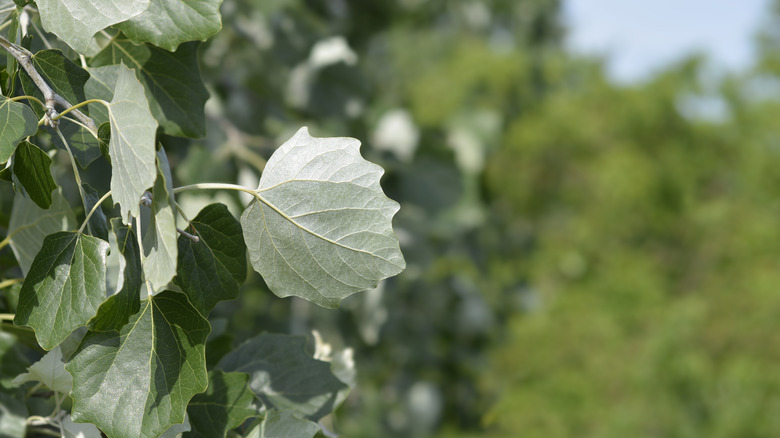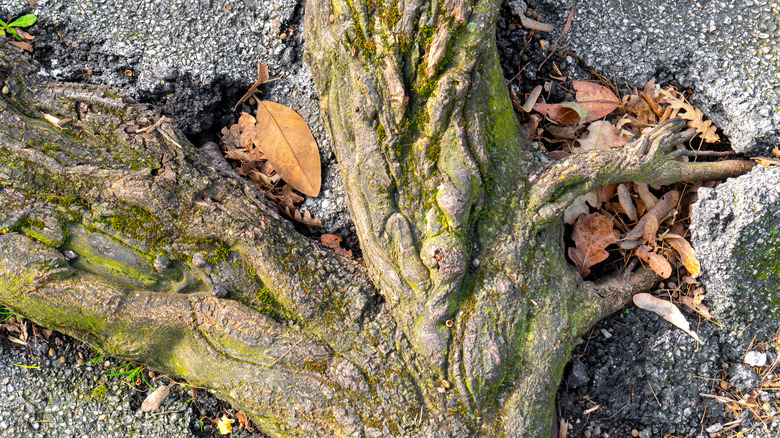Planting A White Poplar Tree In These States Could Cause Trouble For Your Yard
The white poplar, known botanically as Populus alba, is generally an unassuming tree in the landscape until the wind blows. Then the silvery white underside of the leaves flash, complementing the ashy gray of its wrinkled bark. Golf courses and homeowners alike pick this tree because it grows to anywhere between 30-80 feet quickly, but fast growth isn't always a good thing. In many states, this non-native tree species has made its way onto the invasive species list. Though there is no sweeping federal law that bans white poplars, each state can decide to list them as invasive or outright ban them.
According to the USDA, Populus alba is prohibited in Connecticut and restricted in Wisconsin. However, Maine's Department of Agriculture, Conservation, and Forestry also includes Populus alba on its Invasive Plant Do Not Sell List. This official document plainly states that it is illegal to buy, sell, or even propagate any plant listed, and white poplar is included. Because there isn't a clear central hub to check a plant's status as invasive, it doesn't hurt to check with your state's local government for more information before buying. The bright side is that if there is a legal ban in place, nurseries won't be able to sell them to you either.
Why you shouldn't plant white poplar in your yard
Being non-native and a fast grower doesn't necessarily get a plant classified as invasive, though both play a role. To be considered invasive, a plant has to meet two major criteria. First, yes, a plant does have to be non-native to an area for it to be considered invasive to that area. While typically "non-native" refers to plants from outside of the U.S., in this case, it could also mean plants from other regions of the country. Second, some environmental, economic, or human health hazards must be found as well. This distinction is what is keeping your precious peonies off of the banned list. So being declared invasive is a big negative because it inherently implies harm in some capacity.
Populus alba is native to Europe and Central Asia, and it has caused enough damage to be considered invasive in Connecticut, Maine, and Wisconsin. For example, like another invasive tree that could infiltrate your home's plumbing, its shallow roots can also damage sidewalks and sewers. As if that weren't enough, its brittle wood can break easily. While its tendency to push up multiple suckers from its roots makes it useful as a windbreak on your property, it isn't much of a windbreak if the wind breaks the tree. You also can't control where white poplars spread. Because it multiplies primarily by lateral roots and prefers moist soil environments, it can take over floodplain forests.
What to do about the white poplar in your yard
Populus alba is one tree you'll regret planting near your home, but what if it's already there? Whether you want to avoid the hazards mentioned above or you want to do your part in preventing the spread of an invasive species, taking down your white poplar might be your best course of action. How you go about this depends on the size of your tree. Generally, you can kill it with force or kill it with chemicals, because in this case, killing it with fire is not appropriate. If you're lucky and only have young plants to deal with, you can rip them up or dig them up as long as the roots come out of the ground.
The bigger the tree, the more complicated removing it gets. If these signs you need to call a tree service are present, or if the tree is big enough to fall on power lines, houses, or fences, seek professional help from certified arborists. They can cut down the tree and treat the stump with a powerful herbicide to kill the root system. Since white poplars can spread via suckers from their roots, the tree may need multiple treatments before succumbing. Then you can introduce fall color with a type of maple or bring back the white bark with a birch. As long as you don't plant another invasive tree, the stock of your local nursery is your only limit.


